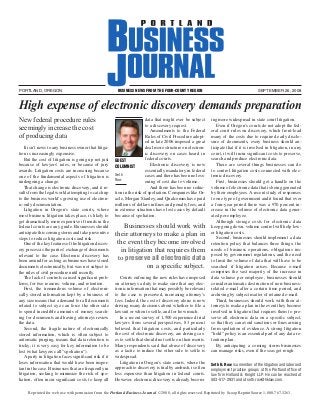
High Cost of Electronic Discovery Demands Preparation
- 1. PORTLAND, OREGON BUSINESS NEWS FROM THE FOUR-COUNTY REGION SEPTEMBER 26, 2008 Reprinted for web use with permission from the Portland Business Journal. ©2008, all rights reserved. Reprinted by Scoop ReprintSource 1-800-767-3263. It isn’t news to any business owner that litiga- tion is increasingly expensive. But the cost of litigation is going up not just because of lawyers’ rates, or because of jury awards. Litigation costs are increasing because one of the fundamental aspects of litigation is undergoing a change. That change is electronic discovery, and it re- sults from the legal world attempting to catch up to the business world’s growing use of electron- ic-only documentation. Litigation in Oregon’s state courts, where most business litigation takes place, is likely to get dramatically more expensive if trends in the federal courts are any guide. Businesses should anticipate this coming storm and take preventive steps to reduce litigation costs and risk. One of the key features of the litigation discov- ery process is the parties’exchange of documents relevant to the case. Electronic discovery has been around for as long as businesses have stored documents electronically, but was not subject to the rules of civil procedure until recently. The lack of controls caused significant prob- lems, for two reasons: volume, and retention. First, the tremendous volume of electroni- cally stored information kept by a business of any size means that a demand for all documents related to subject xyz can force the other side to spend incredible amounts of money search- ing for documents and having attorneys review the data. Second, the fragile nature of electronically stored information, which is often subject to automatic purging, means that data retention is tricky; it is very easy for key information to be lost (what lawyers call “spoliation”). A party in litigation faces significant risk if it loses information that would have been impor- tant in the case. Businesses that are frequently in litigation, seeking to minimize the risk of spo- liation, often incur significant costs to keep all data that might ever be subject to a discovery request. Amendments to the Federal Rules of Civil Procedure adopt- ed in late 2006 imposed a great deal more structure on electron- ic discovery on cases heard in federal courts. Electronic discovery is now essentially mandatory in federal cases and there has been no less- ening of cost due to volume. And there has been no reduc- tion in the risk of spoliation. Companies like Or- acle, Morgan Stanley, and Qualcomm have paid millions of dollars in fines and penalty fees, and in extreme situations have lost cases by default because of spoliation. Courts enforcing the new rules have imposed on attorneys a duty to make sure that any elec- tronic information that may possibly be relevant to the case is preserved, increasing attorney’s fees. Indeed, the cost of discovery alone is now driving many decisions about whether to file a lawsuit or when to settle, and for how much. In a recent survey of 1,500 experienced trial lawyers from several perspectives, 83 percent believed that litigation costs, and particularly the cost of electronic discovery, are driving cas- es to settle that should not settle on their merits. Many respondents said that abuse of discovery as a tactic to induce the other side to settle is widespread. Litigation in Oregon’s state courts, where the approach to discovery is trial by ambush, is often less expensive than litigation in federal courts. However, electronic discovery is already becom- ing more widespread in state court litigation. Even if Oregon’s courts do not adopt the fed- eral court rules on discovery, which front-load many of the costs due to required early disclo- sure of documents, every business should an- ticipate that if it is involved in litigation, in any court, it will incur significant costs to preserve, search and produce electronic data. There are several things businesses can do to control litigation costs connected with elec- tronic discovery. First, businesses should get a handle on the volume of electronic data that is being generated by their employees. A recent study of responses to one type of government audit found that over a four-year period there was a 970 percent in- crease in the volume of electronic data gener- ated per employee. Although storage costs for electronic data keep going down, volume control will help low- er litigation costs. Second, businesses should implement a data retention policy that balances three things: the needs of business operations, obligations im- posed by government regulations, and the need to limit the volume of data that will have to be searched if litigation arises. Because e-mail comprises the vast majority of the increase in data volume per employee, businesses should consider automatic destruction of non-business- related e-mail after a certain time period, and archiving by subject matter of retained e-mail. Third, businesses should work with their at- torneys to make a plan in the event they become involved in litigation that requires them to pre- serve all electronic data on a specific subject, so that they can avoid sanctions or fines arising from spoliation of evidence. A strong litigation “hold” policy is an essential part of any data re- tention plan. By anticipating a coming storm businesses can manage risks, even if the seas get rough. Seth H. Row is a member of the litigation and labor and employment practice groups at the Portland office of law firm Holland & Knight LLP. He can be reached at 503-517-2931 and at seth.row@hklaw.com. High expense of electronic discovery demands preparation GUEST COLUMNIST Seth Row Businesses should work with their attorneys to make a plan in the event they become involved in litigation that requires them to preserve all electronic data on a specific subject. New federal procedure rules seemingly increase the cost of producing data
